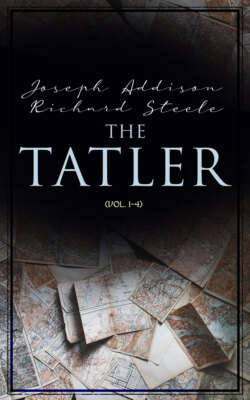Читать книгу The Tatler (Vol. 1-4) - Joseph Addison - Страница 122
Will's Coffee-house, June 17.
ОглавлениеThe suspension of the playhouse310 has made me have nothing to send you from hence; but calling here this evening, I found the party I usually sit with, upon the business of writing, and examining what was the handsomest style in which to address women, and write letters of gallantry. Many were the opinions which were immediately declared on this subject: some were for a certain softness; some for I know not what delicacy; others for something inexpressibly tender: when it came to me, I said there was no rule in the world to be made for writing letters, but that of being as near what you speak face to face as you can; which is so great a truth, that I am of opinion, writing has lost more mistresses than any one mistake in the whole legend of love. For when you write to a lady for whom you have a solid and honourable love, the great idea you have of her, joined to a quick sense of her absence, fills your mind with a sort of tenderness, that gives your language too much the air of complaint, which is seldom successful. For a man may flatter himself as he pleases, but he will find, that the women have more understanding in their own affairs than we have, and women of spirit are not to be won by mourners. Therefore he that can keep handsomely within rules, and support the carriage of a companion to his mistress, is much more likely to prevail, than he who lets her see, the whole relish of his life depends upon her. If possible therefore divert your mistress, rather than sigh to her. The pleasant man she will desire for her own sake; but the languishing lover has nothing to hope from but her pity. To show the difference I produced two letters a lady gave me, which had been writ to her by two gentlemen who pretended to her, but were both killed the next day after the date at the battle of Almanza. One of them was a mercurial gay-humoured man; the other a man of a serious, but a great and gallant spirit. Poor Jack Careless! This is his letter: you see how it is folded: the air of it is so negligent, one might have read half of it by peeping into it, without breaking it open. He had no exactness.
"MADAM,
"It is a very pleasant circumstance I am in, that while I should be thinking of the good company we are to meet within a day or two, where we shall go to loggerheads, my thoughts are running upon a fair enemy in England. I was in hopes I had left you there; but you follow the camp, though I have endeavoured to make some of our leaguer ladies drive you out of the field. All my comfort is, you are more troublesome to my colonel than myself: I permit you to visit me only now and then; but he downright keeps you. I laugh at his Honour as far as his gravity will allow me; but I know him to be a man of too much merit to succeed with a woman. Therefore defend your heart as well as you can, I shall come home this winter irresistibly dressed, and with quite a new foreign air. And so I had like to say, I rest, but alas! I remain,
"Madam,
"Your most obedient,
"Most humble Servant,
"JOHN CARELESS."
Now for Colonel Constant's epistle; you see it is folded and directed with the utmost care.
"MADAM,
"I do myself the honour to write to you this evening, because I believe to-morrow will be a day of battle, and something forebodes in my breast that I shall fall in it. If it proves so, I hope you will hear, I have done nothing below a man who had a love of his country, quickened by a passion for a woman of honour. If there be anything noble in going to a certain death; if there be any merit, that I meet it with pleasure, by promising myself a place in your esteem; if your applause, when I am no more, is preferable to the most glorious life without you: I say, madam, if any of these considerations can have weight with you, you will give me a kind place in your memory, which I prefer to the glory of Cæsar. I hope, this will be read, as it is writ, with tears."
The beloved lady is a woman of a sensible mind; but she has confessed to me, that after all her true and solid value for Constant, she had much more concern for the loss of Careless. Those great and serious spirits have something equal to the adversities they meet with, and consequently lessen the objects of pity. Great accidents seem not cut out so much for men of familiar characters, which makes them more easily pitied, and soon after beloved. Add to this, that the sort of love which generally succeeds, is a stranger to awe and distance. I asked Romana, whether of the two she should have chosen had they survived? She said, she knew she ought to have taken Constant; but believed she should have chosen Careless.
